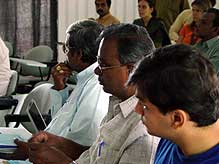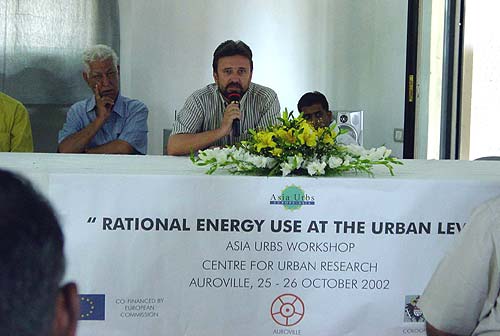 |
Worshop Events
The complete activities of the workshop were divided into three sessions;
two of presentations and one session on 25th afternoon for site visits
in Auroville. The participants were asked to fill up a brief questionnaire
to highlight the energy- based expenditures such as electricity for street
lighting, pumping, vehicular expenses with respect to the population and
the area of the city. The questionnaire also raised issues on management
and environment initiatives taken by the civic body. The objective of
the questionnaire was to enlighten the existing scene in the respective
cities and also particularly for the coordinator Prof. Mohanty, who believed
that the first step in urban management was that of the energy sector
were positive initiatives and simple measures will directly reflect on
the energy bills of the municipality.
Friday 25th October 2002:
The workshop started on Friday 25th October, at 9am. After a brief introduction
and a participant's familiarization, the different presentations scheduled
for the day took place.
- "Presentation of the workshop objectives"-
by Brahmanand Mohanty
'If you cannot protect your environment, your environment cannot sustain
you' Mohanty elaborated further how on an urban level this means we
need to take care of all our natural resources: water, soil, wood, energy.
This workshop focused on "rational energy use at urban level",
and different elements of this approach were to be presented: conscious
planning, use of renewable energies, demand side management and more.
- "Introduction to Auroville's Master
Plan: elements of energy conscious planning"- by Lalit
Kishor Bhati.
Lalit highlighted how energy is an essential and very strongly interlinked
aspect of growth and development in the urban planning. Reasons for
high energy consuming development approach in the past, and also in
the present, include poor awareness and capacity to implement the concept
of 'resource management', dependency on external resources, motorized
transportation system, low public awareness and participation etc..
Auroville was presented as a case study and the highlights of energy
conscious approach for integrated sustainable development were explained.
- "Approach to urban energy management"-
by Brahmanand Mohanty. Every city in the world nowadays depends on fossil
fuels to fulfil its energy needs, with serious harmful impact on the
environment. The solution lies in managing energy needs and changing
energy sources. Cities for Climate Protection (CCP) are working together
with local governments to use a comprehensive and strategic energy management
approach that eventually leads to reduce greenhouse gas emissions.
There are over 400 participating local governments in 63 countries.
The five milestones of a CCP performance include? conducting an energy
and emission inventory and forecast, adopting an energy and emission
goal, developing a local action plan, implementing policies and measures,
and finally monitoring and verifying the results. Case studies in
the Philippines, Mexico and India were also presented.
- "Electricity demand management in Auroville"
by Charles.
Benefits of a demand side management can be seen from a customer perspective
(lower bills, improved electricity supply), a national perspective (less
import of fossil fuels, lower risk from supply vulnerabilities), and
also from a societal perspective (lower environmental emissions). The
Auroville case is illustrated: options for demand side management, electricity
consumption, understanding of the tariff structure etc. Some examples
on energy consumption patterns for lighting, refrigerators, fans and
office equipments were also given.
- "Introduction of Auroville's activities
related to urban energy management" by Tency Baetens.
The presentation focused on Auroville's efforts, over the years, in
building up urban management criteria that would respect the environment.
The use of green energies like wind power and solar was addressed and
in particular two main Auroville's project were presented: the solar
bowl, a solar system that allows to cook daily for more than 1000 people,
and the Matrimandir solar plant, a 36 kW installation of photovoltaic
panels, unique in the world. Further topics included the use of ferro-cement
as low-cost building material, the development of appropriate wastewater
treatment and solid waste management systems, and the importance of
trainings and education among technicians and people.
The afternoon was dedicated to site visits:
Solar bowl at the solar kitchen,
Vikas residential community,
Matrimandir, Matrimandir power plant,
Centre for Scientific Research (CSR).

Saturday 26th October 2002:
Saturday's session started again at 9am. The following presentations
took place:
- "Energy-efficient designing and management
of municipal buildings"- by Brahmanand Mohanty.
Together with the application form for the workshop, the participants
were asked to fill out a little questionnaire about the electricity
consumption and the energy management in their municipalities. All the
information collected was analyzed and the results shown during this
presentation. For all the participants it was a very interesting way
and an effective tool to compare their work with the other municipalities
of south India. Particularly data like electricity used for lighting
and for pumping-supplying water, and data of the costs connected to
these operations were presented.
- "Green energy supply options"-
by Hemant Lamba.
The state of the world energy is that, we have big utilities, over centralized,
often monopolies, politically dominating and distant from users. Changes
for good in these past years have been caused by deregulation, bankruptcy
(Enron), political debacles (September 11th) and also technical innovations.
Rising scenarios focus on more distributed/decentralized power, energy
service providers, smaller utilities and a closer relation between user
and producer. The presentation focused mainly on the green resources:
sun, wind, hydro, oceans, wood and waste. Emerging technologies were
presented and Auroville's use of green power was given as an example
of commitment to environment and ecology. Furthermore renewable energy
options for urban India were discussed.
- "Solar energy in Auroville"-
by Karen Stocker.
The presentation illustrated the potential for solar applications in
India, focusing on the Auroville case as a successful example. Two situations
were mainly addressed: solar energy for pumping water and solar energy
for charging batteries, presenting both their advantages and disadvantages.
Furthermore a detailed cost analysis of solar compared to grid-electricity
was presented and some advices on how to improve the overall performance
of the system, how to reduce the water and the energy consumption were
given.
- "Demand side management for utilities"
by R.K. Iyer.
In the energy management field, objectives of a demand side management
(DSM) include technical loss reduction in distribution systems, customer
education and service, improvement in supply quality and end use efficiency
up gradation. By identifying problems, finding possible solutions ad
educating the customer, DSM can be a very effective tool. The presentation
illustrated a few case studies and showed how from an efficient DSM
everyone wins: the customer, the utility and the Energy Service Company.
- "Water-energy nexus, sharing Auroville's
experience" - by Brahmanand Mohanty.
In municipal operations, the electricity cost needed for water pumping
represents usually 60-70% of the total cost. By starting from this statement,
the presentation showed a few successful stories of different Indian
municipalities, where efficiency improvement options led to save water
by acting on the losses, to reduce the energy use without affecting
the yield, and finally to reduce the peak demand charges in the electricity
bill. The lesson learnt is that there is a significant energy efficiency
improvement potential in the municipal water systems, with attractive
benefits starting from modest investments. Beneficiaries include both
municipalities and the customers.
- "Geographical Information System as
an effective tool for energy management" by Jayanta
Ganguly.
Auroville GIS Centre has established a collaborative work between
CAD and GIS engines, which allows to get a detailed spatial database
of the area by using differential GPS and electronic theologise for
survey-grade mapping, IRS satellite images for base map generation,
and CAD to draft all the mapping works. Currently the database includes
data revenue boundaries, wells, groundwater and meteorology, electrical
distribution system, built-up infrastructure, resident's master list,
natural resources (water bodies, forests, etc), derived structures (geomorphology,
land-use/cover), regional administrative boundaries and settlements,
and all India census. GIS is believed to be an effective tool for energy
management, and more in general for urban planning.
|
|














